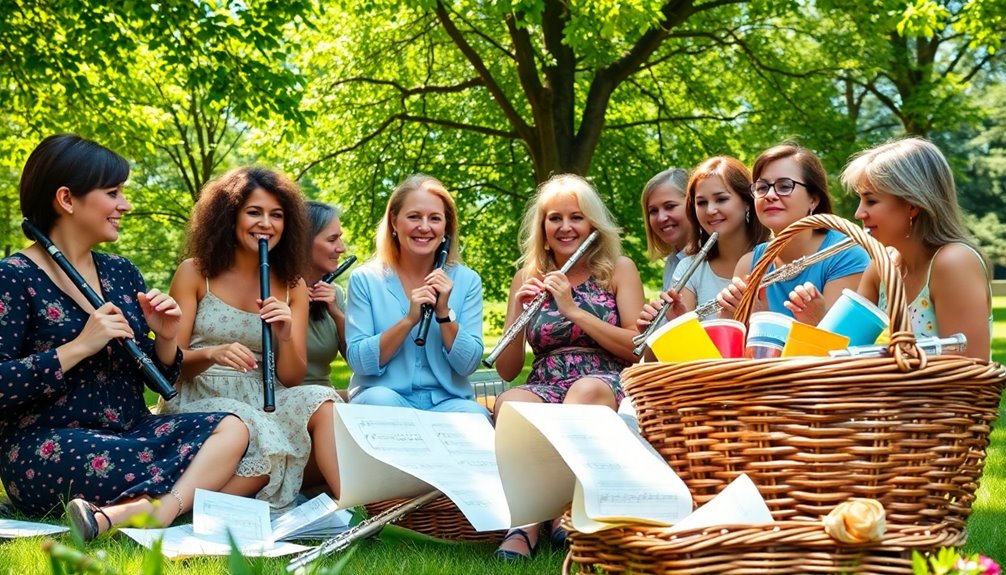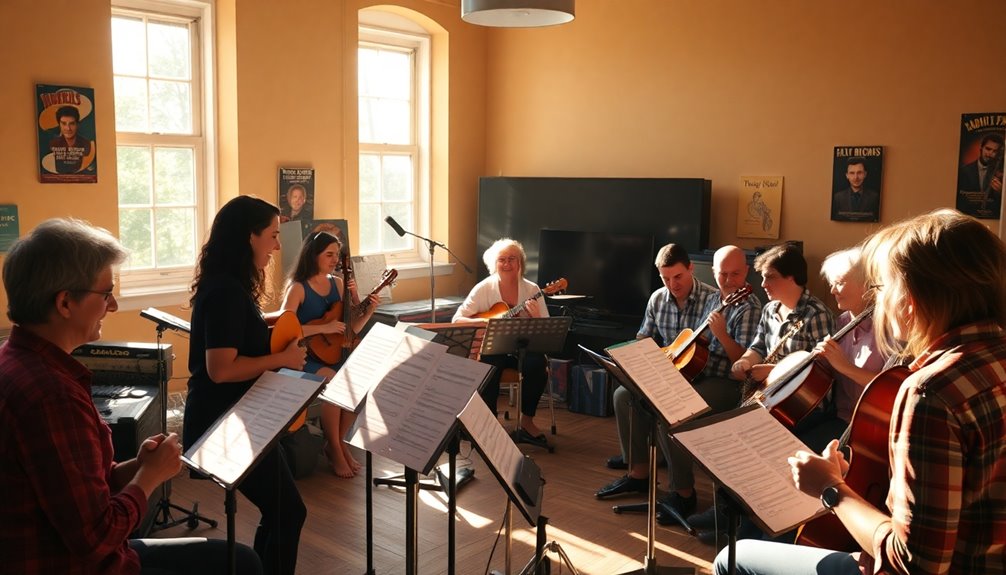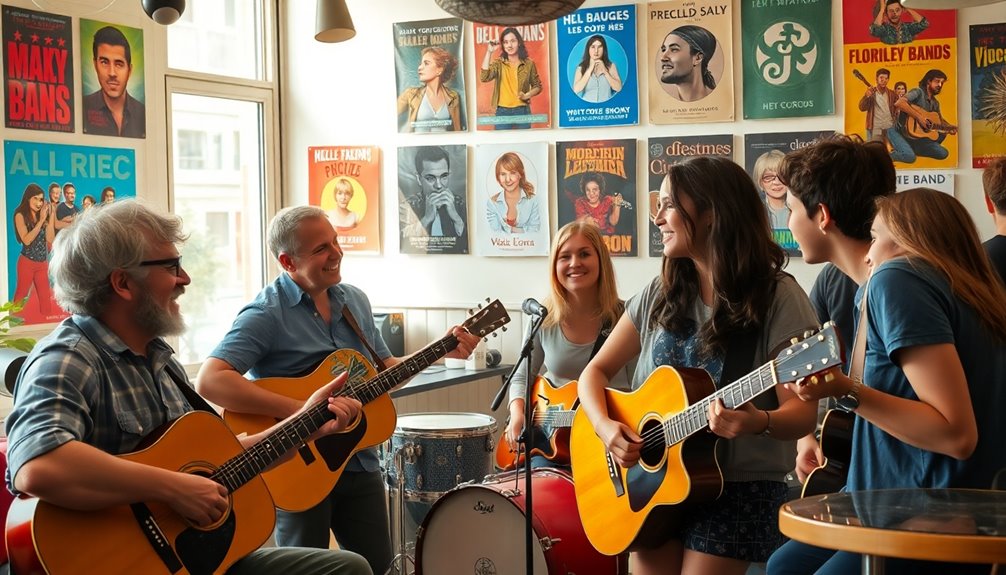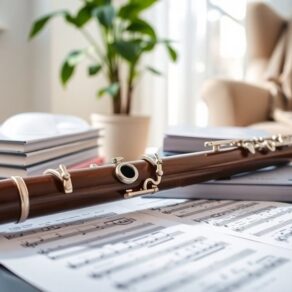To join a local music group successfully, start by researching available options in your area. Check community centers and platforms like Meetup or Facebook to find groups that fit your style. Next, attend open rehearsals to grasp group dynamics and etiquette—this is your chance to observe before jumping in. Finally, network with fellow musicians at local gigs or open mics to create authentic connections. Don't hesitate to share your work and invite others to collaborate on projects. Each step opens new doors, and there's plenty more to explore on enhancing your musical journey.
Key Takeaways
- Research and find local music groups through community centers, online forums, and social media platforms to identify suitable options for your interests.
- Attend open rehearsals to observe group dynamics and etiquette, allowing you to gauge if the environment suits your style.
- Network with fellow musicians at local events to build relationships and explore potential collaboration opportunities for projects or jam sessions.
- Understand group dynamics by recognizing roles, communication styles, and the balance between structured practice and spontaneity to enhance your integration.
- Invest in a quality instrument that suits your level, as it can significantly improve your playing experience and overall performance.
Research Local Flute Groups

When you're ready to immerse yourself in the world of music, researching local flute groups can be an exciting first step. You'll find that connecting with flutists who share your passion can create a sense of belonging that's hard to beat.
Start by exploring community centers, music schools, and local online forums. Websites like Meetup or Facebook often have dedicated pages for music enthusiasts, where you can discover groups that suit your interests.
As you embark on finding local groups, consider what type of atmosphere you're looking for. Are you drawn to casual gatherings or more structured ensembles? Each group has its own vibe, so it's important to find one that resonates with you.
Don't hesitate to reach out to group leaders or members; they're usually more than happy to share their experiences and make you feel welcome.
While researching, pay attention to the types of events these groups host. Some might focus on performance opportunities, while others prioritize learning and collaboration. This can give you a clearer picture of where you might fit in. Additionally, consider investing in the best student flutes, as having a quality instrument can enhance your experience in these groups.
Attend Open Rehearsals

Diving into the world of local music groups often starts with attending open rehearsals. These sessions are your golden ticket to experiencing the group dynamic and understanding how the ensemble operates. It's a perfect chance to see if the vibe resonates with you.
Whether you're a seasoned musician or just starting out, immersing yourself in these rehearsals can ignite your passion and creativity.
Before you go, familiarize yourself with open rehearsal etiquette. Arrive on time, dress appropriately, and bring your instrument or materials. Respect the musicians and their space—quietly observe at first, and if invited, participate.
This is a time for everyone to refine their craft, so be mindful of the group's needs.
Don't underestimate the value of improvisation opportunities during these rehearsals. Often, groups will encourage spontaneous playing, which can be a fantastic way to showcase your skills and creativity. Incorporating essential flute techniques can enhance your participation and overall performance.
Be open to collaboration; it's where magic happens! Jump in when you feel comfortable, but remember that listening is just as important as playing.
Engaging fully in these rehearsals helps you forge connections with fellow musicians, making it easier to find your place in the group.
By committing to this process, you're not just honing your talent; you're also stepping into a community that shares your love for music.
Network With Fellow Musicians

Building relationships within the local music scene can greatly enhance your experience and opportunities. Networking with fellow musicians isn't just about exchanging contact information; it's about fostering genuine connections that can lead to exciting collaborative projects and memorable jam sessions.
Start by attending local gigs, open mics, or music festivals where you can meet artists in a relaxed setting. Don't hesitate to strike up conversations—ask about their music, influences, or upcoming performances. This shows your interest and helps you form authentic bonds.
Once you've made some connections, consider inviting musicians to collaborate on creative endeavors. Whether it's writing a song together or organizing a small jam session, working alongside others can spark new ideas and improve your skills.
Plus, it's an excellent way to showcase your talent and learn from others. Don't shy away from sharing your own work, too; you never know who might be inspired by your sound.
Social media can also be a powerful tool for networking. Join local music groups or forums where you can share your experiences and connect with like-minded individuals. Engage actively—comment on posts, share your music, and participate in discussions.
This not only boosts your visibility but also helps you stay in the loop about upcoming events and opportunities. Additionally, joining a local ensemble can provide performance opportunities that enhance your skills and boost confidence.
Ultimately, the key to successful networking is authenticity. Approach every interaction with a genuine interest in your fellow musicians, and you'll find that the local music scene can become a vibrant community where you truly belong.
Frequently Asked Questions
What Should I Wear to a Rehearsal or Meeting?
When deciding what to wear to a rehearsal or meeting, think about balancing comfort and style.
You'll want rehearsal attire that allows you to move freely while still looking put-together. Opt for breathable fabrics and layers, especially if you're unsure about the venue's temperature.
Choose shoes that are both stylish and suitable for standing or moving.
Ultimately, wear what makes you feel confident, so you can focus on connecting with others and enjoying the music.
Are There Age Restrictions for Joining Local Music Groups?
In this modern age of musical expression, age eligibility for local music groups can vary widely. Many groups welcome musicians of all ages, while others may have specific youth programs designed for younger participants.
It's crucial to check each group's guidelines, as some may focus on particular age ranges. Don't let age hold you back; there's often a place for everyone who shares a passion for music and community.
How Much Time Commitment Is Typically Expected?
When you join a local music group, you can expect a varying time commitment based on the ensemble's needs.
Typically, rehearsal frequency might range from weekly to bi-weekly, and you'll need to meet practice expectations to keep up with the group's progress.
It's important to communicate your availability and be open to adjustments, as this fosters a sense of belonging and teamwork within the group.
Your dedication will enhance both your skills and the overall experience.
Can I Join Multiple Music Groups at Once?
Absolutely, you can join multiple music groups at once! Think of it like a tapestry; the benefits of diversity enrich your musical experience.
However, managing schedules is key. You'll want to guarantee you can commit to each group without feeling overwhelmed.
Balancing different styles and collaborations can deepen your connections, making you feel like you truly belong in a vibrant community.
Embrace the challenge, and watch your musical journey flourish!
What if I Have Limited Experience With My Instrument?
If you've got limited experience with your instrument, don't worry! Starting small is a great way to build your skills and confidence.
Consider finding a mentor who can guide you and offer valuable feedback. They can help you navigate your journey and introduce you to local music groups.
Conclusion
Joining a local music group can be a rewarding experience, opening doors to new friendships and musical growth. As the saying goes, "It takes a village," and connecting with fellow musicians can enhance your skills and enjoyment. By researching groups, attending rehearsals, and networking, you're not just playing an instrument; you're becoming part of a community. So, take that leap—your next musical adventure awaits, and who knows what harmonious connections you'll make along the way!






